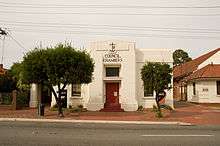City of Swan
| City of Swan Western Australia | |||||||||||||
|---|---|---|---|---|---|---|---|---|---|---|---|---|---|
 | |||||||||||||
| Population | 132,082 (2015 est)[1] | ||||||||||||
| • Density | 126.52/km2 (327.67/sq mi) | ||||||||||||
| Established | 1871 | ||||||||||||
| Area | 1,044 km2 (403.1 sq mi) | ||||||||||||
| Mayor | Mick Wainwright | ||||||||||||
| Council seat | Midland | ||||||||||||
| Region | Eastern Metropolitan Perth, Swan Valley | ||||||||||||
| State electorate(s) | Bassendean, Midland, Swan Hills, West Swan, Mirrabooka | ||||||||||||
| Federal Division(s) | Perth, Cowan, Hasluck, Pearce | ||||||||||||
 | |||||||||||||
| Website | City of Swan | ||||||||||||
| |||||||||||||
The City of Swan is a local government area of Western Australia. It is in Perth's eastern metropolitan region and includes the Swan Valley, centred approximately 20 km north-east of the Perth Central Business District (CBD). The City covers an area of 1,044 km² (much of which is uninhabited) and has a population of about 132,000.[2] At the 2001 census, 10% of the population were born in the United Kingdom, while significant Southern European and South-East Asian minorities are also located here.
History
The City of Swan began as three entities:
- The Municipality of Guildford, gazetted in 1871.
- The Municipality of Helena Vale, gazetted in 1895, becoming the Municipality of Midland Junction in 1901 and the Town of Midland in 1961.
- The Swan Roads Board, gazetted in 1871.
On 1 July 1961, Guildford and the Swan Roads Board merged into the Shire of Swan-Guildford. Swan-Guildford and Midland united on 1 April 1970 as the Shire of Swan, and 30 years later, on 1 April 2000, became the City of Swan.[3]
On 1 July 2016 the portion of Noranda north of Widgee Road was transferred to the City of Bayswater.[4]
Wards
The City of Swan is divided into 7 wards, most of which have three Councillors:
- Altone Ward (3 Councillors)
- Ballajura Ward (3 Councillors)
- Midland/Guildford Ward (3 Councillors)
- Ellenbrook (3 Councillors)
- Swan Valley Gidgegannup (2 Councillors)
- North Ward (1 Councillor)
Suburbs
Population

The populations of the City of Swan's antecedents were:
| Year | Total | Swan | Guildford | Midland |
|---|---|---|---|---|
| 1911 | 6,982 | 1,829 | 1,669 | 3,484 |
| 1921 | 9,188 | 2,375 | 1,876 | 4,937 |
| 1933 | 10,948 | 3,501 | 2,039 | 5,408 |
| 1947 | 13,446 | 5,047 | 2,217 | 6,182 |
| 1954 | 17,996 | 7,366 | 2,134 | 8,496 |
| 1961 | 18,653 | 9,397 | 9,256 | |
| 1966 | 19,135 | 9,800 | 9,335 | |
The post-1970 populations of the combined Shire/City of Swan were:
| Year | Population |
|---|---|
| 1971 | 25,682 |
| 1976 | 26,932 |
| 1981 | 31,859 |
| 1986 | 37,383 |
| 1991 | 52,968 |
| 1996 | 68,795 |
| 2001 | 82,126 |
| 2006 | 93,279 |
| 2011 | 108,461 |
Sister cities
References
- ↑ "3218.0 Regional Population Growth, Australia. Table 5. Estimated Resident Population, Local Government Areas, Western Australia". 3 April 2014. Retrieved 11 September 2014.
- ↑ http://forecast.id.com.au/swan/about-forecast-areas
- ↑ WA Electoral Commission, Municipality Boundary Amendments Register (release 2.0), 31 May 2003.
- ↑ Pascual Juanola, Marta (31 March 2016). "Noranda joins Baysy". The Perth Voice. Retrieved 9 April 2016.
External links
Coordinates: 31°53′42″S 115°59′35″E / 31.895°S 115.993°E